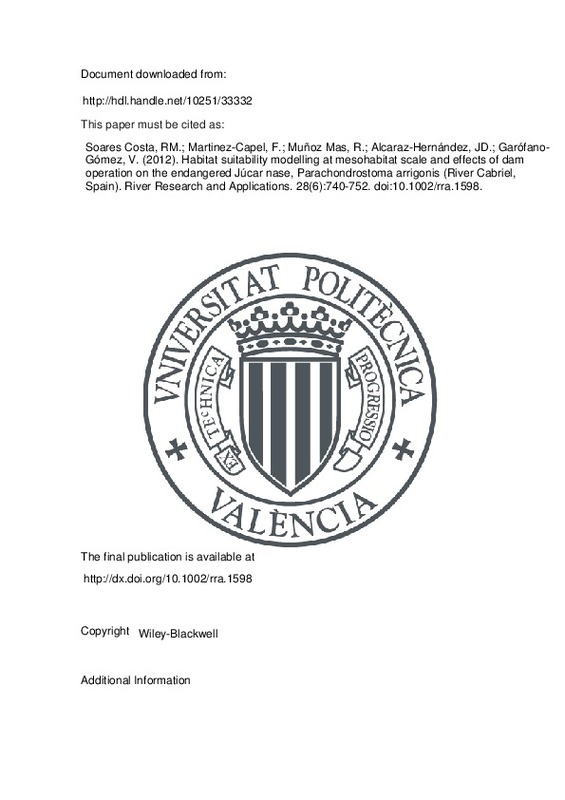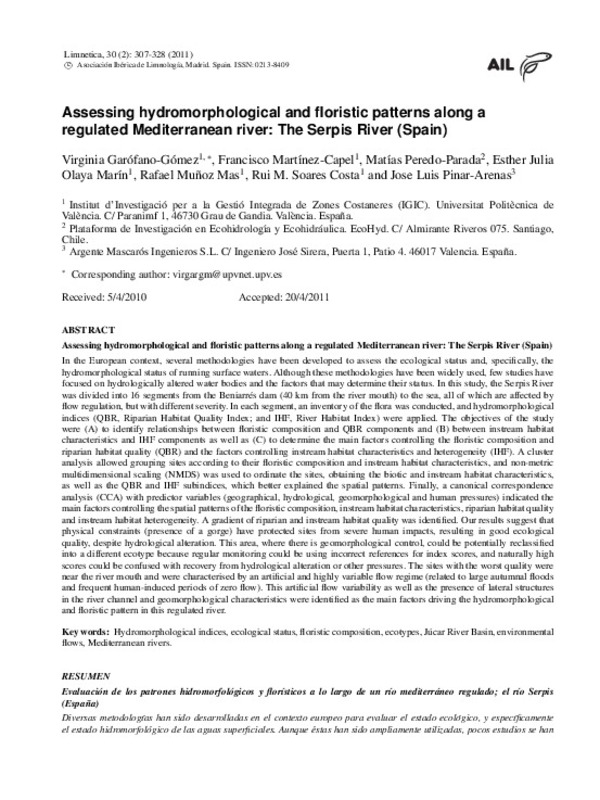Muñoz Mas, R.; Martinez-Capel, F.; Schneider, M.; Mouton, AM. (2012). Assessment of brown trout habitat suitability in the Jucar River Basin (SPAIN): Comparison of data-driven approaches with fuzzy-logic models and univariate suitability curves. Science of the Total Environment. 440:123-131. https://doi.org/10.1016/j.scitotenv.2012.07.074
Por favor, use este identificador para citar o enlazar este ítem: http://hdl.handle.net/10251/33331
|
Título:
|
Assessment of brown trout habitat suitability in the Jucar River Basin (SPAIN): Comparison of data-driven approaches with fuzzy-logic models and univariate suitability curves
|
|
Autor:
|
Muñoz Mas, Rafael

 Martinez-Capel, Francisco
Schneider, Matthias
Mouton, Ans M.
Martinez-Capel, Francisco
Schneider, Matthias
Mouton, Ans M.
|
|
Entidad UPV:
|
Universitat Politècnica de València. Departamento de Ingeniería Hidráulica y Medio Ambiente - Departament d'Enginyeria Hidràulica i Medi Ambient
Universitat Politècnica de València. Instituto de Investigación para la Gestión Integral de Zonas Costeras - Institut d'Investigació per a la Gestió Integral de Zones Costaneres
|
|
Fecha difusión:
|
|
|
Resumen:
|
The implementation of the Water Framework Directive implies the determination of an environmental flow (E-flow) in each running water body. In Spain, many of the minimum flow assessments were determined with the physical ...[+]
The implementation of the Water Framework Directive implies the determination of an environmental flow (E-flow) in each running water body. In Spain, many of the minimum flow assessments were determined with the physical habitat simulation system based on univariate habitat suitability curves. Multivariate habitat suitability models, widely applied in habitat assessment, are potentially more accurate than univariate suitability models. This article analyses the microhabitat selection by medium-sized (10-20. cm) brown trout (Salmo trutta fario) in three streams of the Jucar River Basin District (eastern Iberian Peninsula). The data were collected with an equal effort sampling approach. Univariate habitat suitability curves were built with a data-driven process for depth, mean velocity and substrate classes; three types of data-driven fuzzy models were generated with the FISH software: two models of presence-absence and a model of abundance. FISH applies a hill-climbing algorithm to optimize the fuzzy rules. A hydraulic model was calibrated with the tool River-2D in a segment of the Cabriel River (Jucar River Basin). The fuzzy-logic models and three methods to produce a suitability index from the three univariate curves were applied to evaluate the river habitat in the tool CASiMiR©. The comparison of results was based on the spatial arrangement of habitat suitability and the curves of weighted usable area versus discharge. The differences were relevant in different aspects, e.g. in the estimated minimum environmental flow according to the Spanish legal norm for hydrological planning. This work demonstrates the impact of the model's selection on the habitat suitability modelling and the assessment of environmental flows, based on an objective data-driven procedure; the conclusions are important for the water management in the Jucar River Basin and other river systems in Europe, where the environmental flows are a keystone for the achievement of the goals established in the European Water Framework Directive.
[-]
|
|
Palabras clave:
|
Brown trout
,
Data-driven
,
Environmental flow
,
Habitat modelling
,
Mediterranean rivers
,
Spatial analysis
,
Brown trouts
,
Digital storage
,
Environmental regulations
,
Fish
,
Hydraulic models
,
Rivers
,
Water conservation
,
Watersheds
,
Ecosystems
,
Algorithm
,
Discharge
,
Fuzzy mathematics
,
Habitat selection
,
Microhabitat
,
Multivariate analysis
,
Numerical model
,
River system
,
Salmonid
,
Water management
,
Article
,
Calibration
,
Controlled study
,
Data analysis software
,
Environmental factor
,
Environmental impact assessment
,
Fuzzy logic
,
Fuzzy system
,
Habitat quality
,
Kappa statistics
,
Learning algorithm
,
Population abundance
,
Priority journal
,
Process optimization
,
River basin
,
Species habitat
,
Stream (river)
,
Univariate analysis
,
Iberian Peninsula
,
Jucar Basin
,
Spain
,
Salmo trutta
,
Salmo trutta fario
|
|
Derechos de uso:
|
Cerrado |
|
Fuente:
|
Science of the Total Environment. (issn:
0048-9697
)
|
|
DOI:
|
10.1016/j.scitotenv.2012.07.074
|
|
Editorial:
|
Elsevier
|
|
Versión del editor:
|
http://dx.doi.org/10.1016/j.scitotenv.2012.07.074
|
|
Código del Proyecto:
|
info:eu-repo/grantAgreement/MICINN//CSD2009-00065/ES/Evaluación y predicción de los efectos del cambio global en la cantidad y la calidad del agua en ríos ibéricos/
|
|
Agradecimientos:
|
The authors would like to thank the Spanish Ministry of Economy and Competitiveness for its financial support through the project SCARCE (Consolider-Ingenio 2010 CSD2009-00065). We thank the persons who work in the field ...[+]
The authors would like to thank the Spanish Ministry of Economy and Competitiveness for its financial support through the project SCARCE (Consolider-Ingenio 2010 CSD2009-00065). We thank the persons who work in the field and preliminary data analyses, especially Marta Bargay and Aina Hernandez. The works on habitat suitability curves were partially funded by the Confederacion Hidrografica del Jucar (Ministry of Environment, and Rural and Marine Affairs, Spain), which also provided hydrological and environmental information about the study sites. Thanks to Javier Ferrer, Teodoro Estrela and Onofre Gabaldo (Confederacion Hidrografica del Jucar) for the help and the data provided.
[-]
|
|
Tipo:
|
Artículo
|






![[Cerrado]](/themes/UPV/images/candado.png)




